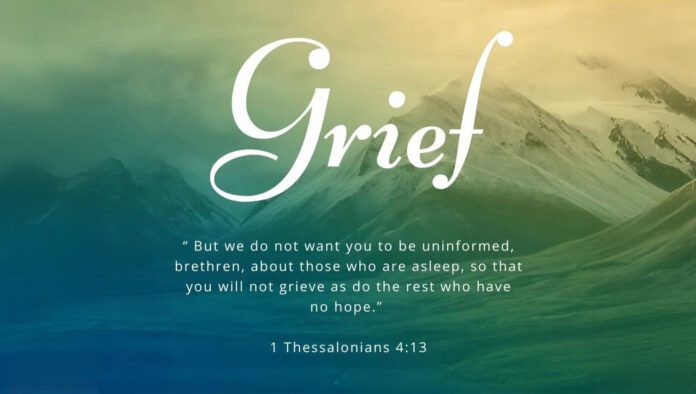Grief dissolves the gilded images we create for ourselves. Loss creates a rare moment when the carefully constructed facades people wear crack open, revealing the raw and tender humanity and faith beneath. The composure, pride, hope, faith and insistence that everything is “under control” lay scattered among anger, confusion, fear and longing. In these moments, more than any other, friends, neighbors and colleagues see the substance of a person’s faith (or lack of it).
The world attempts to comfort the grieving with placations that “death is natural.” The absurd assertion that “death is a part of life” ventures to address the universality of grief. While such statements acknowledge sorrow, they fail to redeem it. Broken hearts grow accustomed to despair when they’re offered explanation without hope.
Those who grieve without Christ know only a sorrow that cannot penetrate the depth of questions that have eternal power like “Why?” and “What now?”
But we do not grieve as those who have no hope (I Thess. 4:13). We who bear the name Christian must embrace a stark divide between the way that we grieve and the world’s despair. The grief we know to be incredibly personal becomes the most marvelous testimony of authentic faith to a watching world.
The Biblical Reality of Grief
John 11:35 records two humbling words: “Jesus wept.” Grief is not something to bypass. Loss hurts. God’s Word holds grief up as honorable and blessed. We’re reminded that “the Lord is near to the brokenhearted and saves the crushed in Spirit” (Psalm 34:18 ESV). To grieve is to love. To love is to risk the pain of loss.
It follows logically that since God called Christians to love by actively pursuing others, we should experience more grief than those who are lost. The statistics tell a different story. Various surveys conclude that people who identify as Christian do not have larger social networks than those who do not identify as Christian.
When despair overcomes us, as the world without hope in the wake of loss, our humanity attempts to protect itself from future heartache. To some degree or another, our human response mirrors Mrs. Havisham wandering through cobweb-filled corridors, perpetually dwelling on loss. Our prayers that sinners be pulled out of the path of Hell turn towards protecting the saints from Heaven.
We must grieve differently. We must acknowledge pain without despair. We must experience our sorrow in the context of hope.
The Paradox of Christian Grief
When the believer’s tears are mingled with confidence in Christ’s resurrection, the watching world encounters a paradox: sorrow that does not consume, anguish that does not embitter, loss that does not destroy. Our lament rests on the assurance that death does not get the final word.
The sting of death is real, but it has been de-fanged by Christ’s triumph. We feel its bite, but we do not fear its permanence.
The world may paper over death with platitudes, but Christians confront it with promise. We stand at the edge of the grave shoulder-to-shoulder with the undone as those who are upheld. We declare with our tears and our testimonies that the One who stood outside Lazarus’s tomb and wept is also the One who called, “Come forth” (John 11:43). And in the twinkling of the eye, He will speak that same resurrection word over all those who are His.
The Practice of Christian Grief
Christian grief transcends a theological concept. It embodies our lives as we experience loss.
First, we value presence over empty words. When someone suffers loss, we avoid the temptation to reach for quick words with empty comfort. The grieving do not need explanations — they need companions. Hope-filled grief does not speak to erase sorrow. Christians reveal Christ’s love by staying.
Michelle and I still talk about our friend Alberto who drove two hours to sit with us the day after her mom passed away. We weren’t much for hosting. We ate the tamales he brought to us. Our tears erupted in the middle of a conversation. We rejoiced in God. We worshiped in sorrow.
Second, we forgive and reconcile. Times of loss have a way of unearthing old wounds. Families in moments of grief tend to discover unresolved conflict. For the believer, these moments, which have the potential to conjure bitterness, offer an opportunity for the invitation of grace. The world knows we belong to Christ through our mercy in the midst of sorrow.
Grief as a Spiritual Discipline
Like prayer and Bible study, grief trains our souls. Grief teaches us that this world is not our home. When practiced well, it loosens our grip on what is temporary and tightens our grip on what is eternal. We embrace Paul’s words to the Corinthians that “this light momentary affliction is preparing for us an eternal weight of glory beyond all comparison, as we look not to the things that are seen but to the things that are unseen” (II Cor. 4:17-18 ESV).
Every tear offered to Christ becomes a teacher. Every loss surrendered to Him becomes a rehearsal for glory. Grieving with hope shapes our hearts to yearn for a better world. My friend, grief provides an excellent vehicle for spiritual growth and development.
Grief as a Testimony
When we grieve as Christians, we tell the world that Jesus is Lord, not only in our laughter, but also in our loss. Death, though powerful, though painful, though sobering, is not ultimate. The gospel doesn’t provide a crutch for the weak, but it certainly provides a rock for the broken.
The tears we shed today are but seeds for the testimony we will tell tomorrow. Christ has conquered death, and in Him, even through grief, we are not undone.



